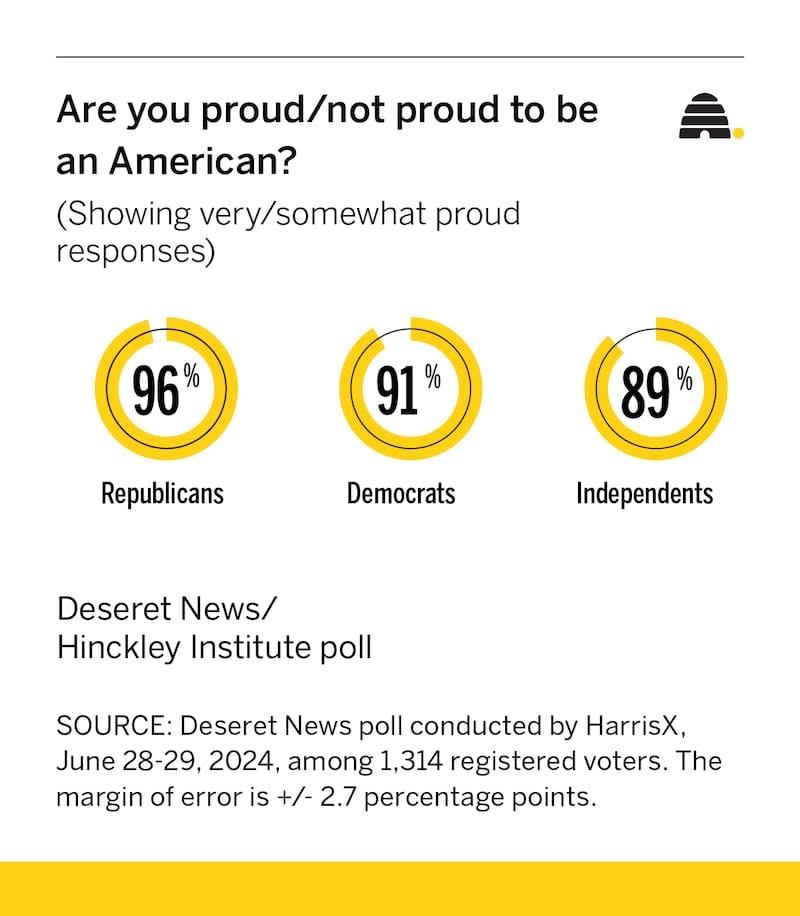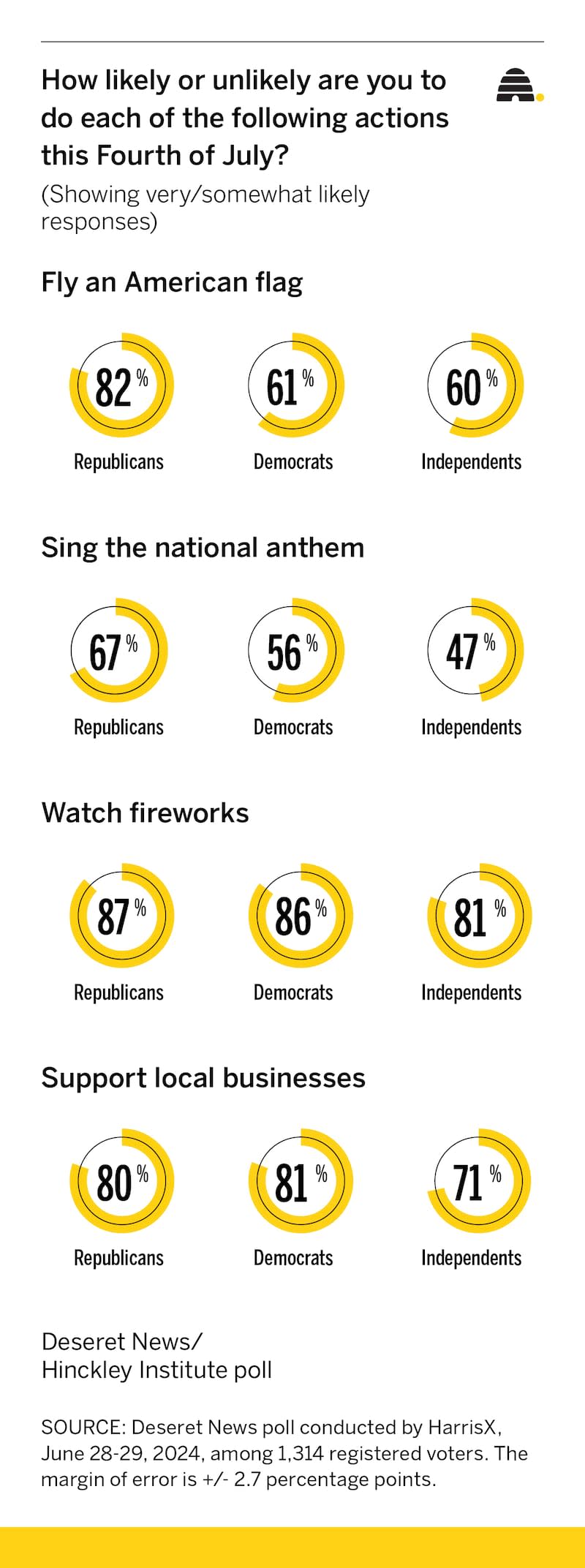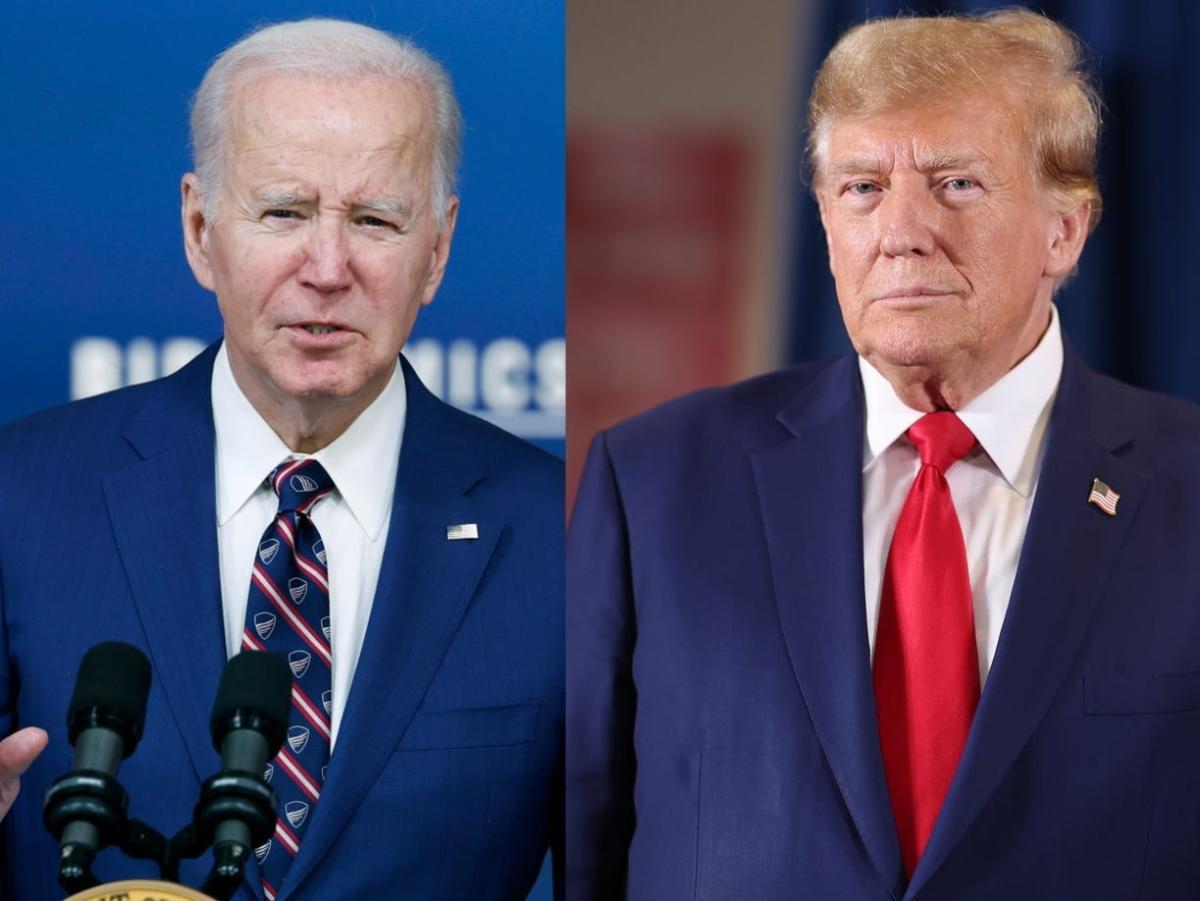The flag. Picnics. Fireworks. A baseball game.
Patriotic symbols are meant to be unifying, but it turns out red America and blue America have some different ways they like to celebrate the Fourth of July. Although, unsurprisingly, everyone loves a good picnic.
A new poll conducted by HarrisX for the Deseret News showed some of the nation’s strongest patriotic symbols were more likely to be embraced by Republicans than Democrats.
When asked whether they planned to fly a flag on Independence Day, 82% of Republicans said they would, compared to 62% of Democrats. Republicans were more likely to say they would say the Pledge of Allegiance (70%) or sing the national anthem (67%). But near-equal numbers of Republicans and Democrats said they would watch fireworks, shop at a small business or volunteer in their community on the Fourth of July.
The poll was conducted by HarrisX on June 28-29, among 1,314 registered voters, and has a margin of error of plus or minus 2.7 percentage points.
Are Americans proud of their country?
The vast majority of Americans, red or blue, said they were proud of their country.
When asked whether they were proud to be an American, 92% of all respondents said they were either very or somewhat proud. Republicans were most likely to say very proud, at 78%, while 64% of Democrats and 56% of independents agreed.
The least likely to say very proud? Young voters, ages 18-34, with only 43% choosing that option — although another 37% said somewhat proud.


This polling tracks with Gallup’s longtime surveys of the U.S. populace on American pride. While the share of U.S. voters in Gallup’s polls who say they are “extremely proud” to be an American is near a record low, nearly 90% of Americans are at least somewhat proud. The gap between Democrats and Republicans, and the old and the young, is present in Gallup’s surveys, too — though “the fact that Republicans tend to be older than Democrats and independents also contributes to the party differences,” Gallup notes.
Do we still believe in American exceptionalism?
When Sen. Mitt Romney, R-Utah, ran for president in 2012, he ran on a platform of American exceptionalism: He called the U.S. “an exceptional country with a unique destiny and role in the world.” It was the title of one of his books: “No Apology: The Case for American Greatness.”
Former President Donald Trump pushed back against the idea shortly before launching his presidential campaign in 2016, saying he didn’t “like the term.” Even so, a section on “American exceptionalism” was included in the GOP platform in both 2016 and 2020, which described it as “the notion that our ideas and principles as a nation give us a unique place of moral leadership in the world.”
This idea that the U.S. is, or should be, a moral light to the rest of the world, is still held by most Americans.
When asked whether they agree more with the statement, “I believe in American exceptionalism, or that the United States is distinctive, unique, and exemplary to countries around the world because of its values, history, and achievements,” or, “I do not believe in American exceptionalism because the United States has as many issues as other countries,” a strong majority — 7 out of 10 — respondents chose exceptionalism.
Republicans were more likely to say the U.S. is exceptional, with 79% choosing that option compared to 68% of Democrats. The older respondents were, the more likely they were to support the idea of American exceptionalism.
On a related question — whether the U.S. is “the greatest country in the world,” or “an excellent country, but we are still working through some issues,” 68% of Republicans chose one of those two options, while 60% of Democrats did. That number dropped to 51% among independent voters.
Over half of voters age 18-34 said the U.S. was either “a good country, but we have many large problems,” or “just OK, because we struggle with systemic problems,” or, “a bad country, many other countries are much better.”


Is the American flag a political symbol?
A significantly larger portion of Republicans (82%) than Democrats (62%) say they plan to fly an American flag on the Fourth of July. And when asked whether they think political ideology affects the decision to fly a flag, most Republicans (51%) said conservatives are more likely, while most Democrats (60%) said both conservatives and liberals were equally likely to fly a flag.
The data seems to match a larger trend in which the American flag means different things to different people, based on political ideology. In 2021, The New York Times reported that flying the flag “is increasingly seen as a clue, albeit an imperfect one, to a person’s political affiliation in a deeply divided nation.” One Harvard Political Review article in 2022 asserted that the flag “has become a symbol of the conservative American, not of shared American values.”
Do red America and blue America celebrate the Fourth differently?
When it comes to celebrating the Fourth of July, Americans across the political divide share more in common than they differ.


Almost equal numbers of Republicans and Democrats say they like to spend time with family, have a barbecue or picnic, or watch fireworks.
But when it comes to decorating, more Republicans (28%) than Democrats (18%) said they like to put up “red, white and blue decorations.”
Least likely to go to a parade? Independent voters, at 16%, about five points behind their Republican and Democratic counterparts.
On the question of whether the Fourth of July was more about spending time with friends and family, or remembering and celebrating American Independence, six out of ten Democrats chose friends and family, while about the same number of Republicans said celebrating independence. Independents sided with the Democrats on this question.

Amanda Smith is a dedicated U.S. correspondent with a passion for uncovering the stories that shape the nation. With a background in political science, she provides in-depth analysis and insightful commentary on domestic affairs, ensuring readers are well-informed about the latest developments across the United States.







